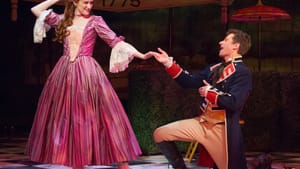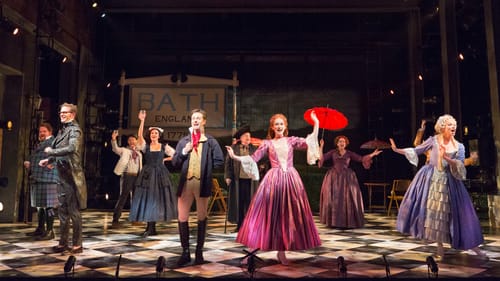Stay in the Loop
BSR publishes on a weekly schedule, with an email newsletter every Wednesday and Thursday morning. There’s no paywall, and subscribing is always free.
Back to the drawing room
Bristol Riverside Theatre presents Peter Kellogg and Stephen Weiner's 'The Rivals'

The Rivals, a new musicalization of Richard Brinsley Sheridan’s 18th-century drawing-room comedy, has lofty aspirations. Promotional materials for Bristol Riverside Theatre’s (BRT) premiere production tout the show as bound for Broadway, although no such transfer is confirmed.
The show, with a libretto by Peter Kellogg and score by Stephen Weiner, has an enviable pedigree. The cast teems with Broadway veterans, including Tony Award winner Harriet Harris (Frasier, Thoroughly Modern Millie) in the central role of Mrs. Malaprop. Eric Tucker, known for putting a fresh spin on classic works with his company Bedlam, directs. The production has a level of polish that surpasses much of what’s usually seen on local stages.
Too easy
Still, there’s a lot of work ahead before The Rivals can claim a place on the Great White Way. Although the cast is highly skilled and Tucker’s staging contains charm and panache, the material often seems sophomoric and undistinguished. Sheridan skewered the aristocracy’s feckless mores in his caustically funny play — still sharp and relevant nearly 250 years after its debut — but this adaptation rarely digs beneath the surface.
Like the late-‘90s musical version of Marivaux’s The Triumph of Love, which BRT mounted last season, the original text’s sly, subtle humor cannot be easily replicated. Kellogg’s weak, witless lyrics aim for facile rhymes that are quickly forgotten, except when they’re too schlocky to ignore (example: “There’s a maid in Devonshire / Who’s lovelier than Heaven-shire”). Weiner’s melodies, played well enough by an offstage band, largely share the lack of distinction.
The dramatic setup proves even direr. The play follows a quartet of lovers who use trickery and deception to prove their devotion to each other — nearly torpedoing their respective romances along the way.
Sheridan used these devices to comment on the repression common in upper-crust enclaves such as Bath, England, where he lived and where the play occurs. (Jason Simms designed the whimsical scenery, complemented by Joe Doran’s elegant lighting). But here, the characters largely come across as trivial and ill-defined, despite fine performances from Erin Mackey (Lydia Languish), Kevin Massey (Captain Jack Absolute), Charlotte Maltby (Julia Melville), and Jim Weitzer (Faulkland).
Mrs. Malaprop, Lydia’s protective aunt, gives our lexicon the word malapropism — the unintentional misuse of a word for a similar-sounding one, according to Merriam-Webster. In this adaptation, those linguistic follies are about all that define the character. When Mrs. Malaprop is here described as “a riddle wrapped in an enema,” I knew that hoping for even a semblance of subtlety was a lost cause.

Harris occasionally pushes too hard for a laugh or plays the humor too broadly, especially in the overly expository first act. She manages some charming, quieter moments in the second act, when the attention shifts to questions of Mrs. Malaprop’s own love life and the realities faced by women after a certain age. But the performance often succeeds in spite of the material, not in service of it.
Not ready for prime time
Among the supporting cast, Ed Dixon (as Sir Anthony Absolute, Jack’s aristocratic father) and strong-voiced Emma Stratton (as Lucy, a scheming lady’s maid) seem most comfortable with the Restoration style the piece requires.
On the other end of the spectrum, John Treacy Egan and Chris Dwan chew the scenery down to a nub as a pair of Lydia’s potential suitors. Egan’s Scottish costume, designed by Lisa Zinni, looks regrettably like a Catholic schoolgirl’s uniform.
Tucker’s metatheatrical production has black-clad stagehands moving set pieces in full view of the audience, a gimmick that quickly grows tiresome. In some of the show’s weaker moments, it’s hard not to feel like the actors are being upstaged by furniture. But the staging comes into its own as the musical progresses and this gimmicky business largely takes a backseat.
Even at its best, this adaptation feels unready for larger stages. Further development is necessary — including a greater connection to Sheridan’s original. As it stands, the point behind the play gets largely lost in schtick.
What, When, Where
The Rivals. By Peter Kellogg and Stephen Weiner, based on the play by Richard Brinsley Sheridan, Eric Tucker directed. Through November 18, 2018, at the Bristol Riverside Theatre, 120 Radcliffe Street, Bristol, Pennsylvania. (215) 785-0100 or brtstage.org.
Sign up for our newsletter
All of the week's new articles, all in one place. Sign up for the free weekly BSR newsletters, and don't miss a conversation.

 Cameron Kelsall
Cameron Kelsall